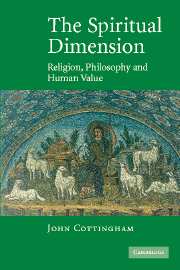Book contents
- Frontmatter
- Contents
- Preface and acknowledgements
- 1 Religion and spirituality: from praxis to belief
- 2 Religion and science: theodicy in an imperfect universe
- 3 Religion and value: the problem of heteronomy
- 4 Religion and self-discovery: the interior journey
- 5 Religion and language: emotion, symbol, and fact
- 6 Religion and the Enlightenment: modernist and postmodernist obstacles
- 7 Religion and the good life: the epistemic and moral resources of spirituality
- 8 Religion and pluralism: which spirituality?
- Bibliography
- Index
5 - Religion and language: emotion, symbol, and fact
Published online by Cambridge University Press: 24 November 2009
- Frontmatter
- Contents
- Preface and acknowledgements
- 1 Religion and spirituality: from praxis to belief
- 2 Religion and science: theodicy in an imperfect universe
- 3 Religion and value: the problem of heteronomy
- 4 Religion and self-discovery: the interior journey
- 5 Religion and language: emotion, symbol, and fact
- 6 Religion and the Enlightenment: modernist and postmodernist obstacles
- 7 Religion and the good life: the epistemic and moral resources of spirituality
- 8 Religion and pluralism: which spirituality?
- Bibliography
- Index
Summary
Die Menschen heute glauben, die Wissenschaftler seien da, sie zu belehren, die Dichter & Musiker etc, sie zu erfreuen. Daß diese sie etwas zu lehren haben; kommt ihnen nicht in den Sinn.(‘People nowadays think that the scientists are there to instruct them, the poets and musicians etc. to entertain them. That the latter have something to teach them never occurs to them.’)
Ludwig Wittgenstein.MODES OF DISCOURSE
The previous chapter set out to explore some of the important interrelations between the discourses of philosophy, religion, and psychoanalysis, and ended by suggesting a certain kind of convergence between the goals of psychological maturity, of moral growth, and of religious enlightenment. Among the results to emerge along the way was the idea of the crucial role played by symbols and symbolic thinking in enabling the individual to reach the level of self-awareness required for moral and spiritual health. This leads us very directly to the topic of this present chapter. For one of the obstacles to fruitful philosophical debate between those who subscribe to and those who reject a theistic worldview appears to be the prevalence of systematic misconceptions about the nature of religious language – misunderstandings about the way it is supposed to operate, and what it means to adopt this mode of discourse. As a very rough first shot, it seems to me that many philosophical critics of religion typically construe acceptance of a religious outlook, and readiness to embrace the discourse of religion, mainly in terms of intellectual assent to a set of theses or doctrines.
- Type
- Chapter
- Information
- The Spiritual DimensionReligion, Philosophy and Human Value, pp. 79 - 101Publisher: Cambridge University PressPrint publication year: 2005



